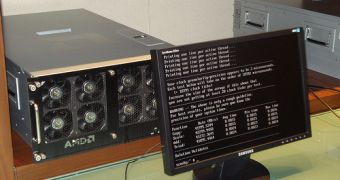Santa Clara, California-based AMD has just announced that it has completed its live public demonstrations of the upcoming six-core processors that will be part of the company's server lineup. Codenamed Istanbul, the new processors are based on AMD's 45nm process technology and will be coming out in the second half of this year, as part of the chip maker's Opteron family of server processors. With the launch, AMD's Istanbul processors will become the first x86 six-core processors to be available for both two- and four-socket server platforms enabling performance in a number of configurations.
“Thus far we see impressive performance and performance-per-watt results in our initial ‘Istanbul’ testing. We expect global OEMs and solution providers to begin shipping systems based on ’Istanbul’ in the second half of this year,” said John Fruehe, director of business development, Server Workstation, AMD.
The demonstrations were based on a system that was functioning on a 45nm quad-core Opteron processor, which was later upgraded to an Istanbul processor, as AMD's next-generation of Opteron server processors are socket and thermal-compatible with the company's current Opteron-based platforms. This feature allows the company's customers to significantly reduce costs while they are upgrading their server systems to the latest-generation technologies for higher performance.
AMD has set up a number of web pages with details on its upcoming Istanbul processors, including pictures and videos of the live demonstrations.
One of the main features of the upcoming six-core Opteron processors designed by AMD is that they will enable users to upgrade without them being required to change the entire server platform. These chips will boast an L2 cache of 6MB and support dual-channel DDR2 memory. Consequently this allows for some financial benefits as users will be able to save money on an otherwise more expensive upgrade.
Here's one of the videos provided by AMD as part of its demonstration:

 14 DAY TRIAL //
14 DAY TRIAL //